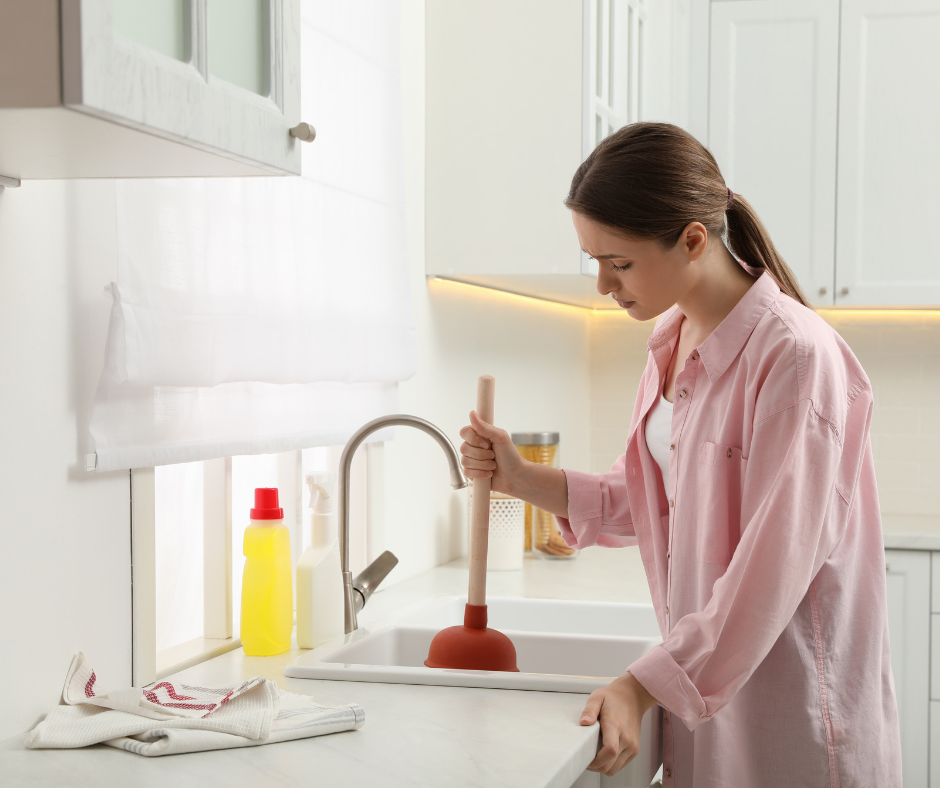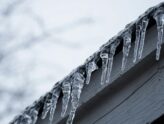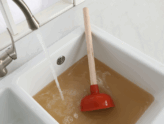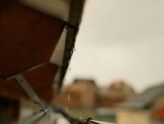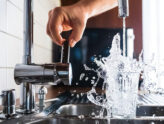In this guide to preventing drain blockages, we dig into all the tips and tricks that our plumbers recommend to keep your drains clear, preventing unpleasant smells from making their way into your home, allowing for faster drainage, and avoiding damage to your plumbing.
Serving clients across Durham region, the team at Caldwell Plumbing has been clearing drain blockages and offering drain blockage prevention for decades. Here is what you can do to keep your drains clear and avoid clogs.
Understanding Drain Blockages
Any drain can become blocked. The most common types of drain blockages include kitchen sink blockages, bathroom drain blockages, and outdoor drain blockages. There are several signs to look for that could indicate a clog in your system.
- Water is slow to drain from sinks, bathtubs, or showers.
- Unpleasant smells are coming up from your plumbing.
- When water drains, there are gurgling sounds or bubbles that come up from the pipe.
- Unexplained wet patches around your property near plumbing are a sign of buildup in your pipes.
- An increase in fruit flies or other pests around drains indicates there could be trapped organic material inside.
- Water backing up is a sure sign you have a blockage somewhere in your plumbing system.
How to Prevent Drain Blockages
Regular Maintenance
Preventing drain blockages is all about minimizing the risk of something getting stuck in your pipes. Regular plumbing maintenance takes almost no effort. First, always use drain screens and filters to catch any food debris that may find its way into your sink. Secondly, clean your drains regularly by filling up your sink with hot water. Then pull the plug and let it drain. The rush of the hot water can clear out debris that may be stuck.
Proper Disposal Methods
Here are some of the household staples that should never end up in your drains.
- Hygiene products, such as tampons, condoms, wipes, cotton swabs, dental floss, and diapers, should go into the trash can.
- Do not pour any type of animal fat, oil, or cooking grease down the drain, as it can become thick and hard and coat your pipe. Cooking oils and grease should be allowed to cool completely and then contained before disposing of them.
- Never pour down any hazardous waste, such as paint or pesticides. Each municipality has its own instructions on how to dispose of this type of waste, but your plumbing system is never the answer.
- Coffee grounds are also known to be a common cause of drain blockages. Ensure old coffee grounds are being put into the trash can or compost and not down the sink.
Use a Drain Stopper
Use a drain stopper to minimize the risk of hair going down the tub or shower drain. This is a must, especially if you or someone you’re living with has long hair. Hair clogs are a very common problem but are easy to avoid with a little effort.
Outdoor Drain Care
Keep your gutters and downspouts clear to protect the function of your outdoor drains. Ensure garden and lawn debris is handled properly and that organic waste materials are not finding their way into your plumbing. Follow this guide to preventing drain blockages to minimize the risk of clogs and flooding in your outdoor space.
When to DIY and When to Call a Professional Plumber
For a minor drain blockage, you don’t need to call a plumber. You can DIY minor blockages using a plunger to apply pressure to a blockage and clear it.
A homemade drain cleaning solution can also do the trick. A simple drain cleaner is a half-cup of table salt and a half-cup of baking soda, and letting it sit for a half-hour before following it with a pot of hot water. If this doesn’t work, you can attempt to pull the blockage up or physically break it apart with a drain snake.
Sometimes, preventing drain blockages just isn’t possible on your own, and for this, you want to contact a professional. If you notice persistent blockages, foul orders, or water is still draining slowly despite your best efforts, call one of the experts at Caldwell Plumbing. We can effectively clear your blockage and give you honest advice on the best way to prevent it from happening again.
Contact the Experts at Caldwell Plumbing
Mindfulness and some preventative maintenance can help your drain system work at its best all year long. Taking extra steps, such as installing drain guards, can help a great deal; however, knowing what not to put down your drain is arguably what’s most important. Maintaining good habits and following our guide to preventing drain blockages should keep your drains flowing smoothly.
If you have emergency issues or would like to schedule a high pressure drain cleaning, Caldwell Plumbing is at your service. We’ll give you an honest quote no matter what, with no hidden fees. The next time you need a plumber for a clogged drain, trust the experts at Caldwell Plumbing.

